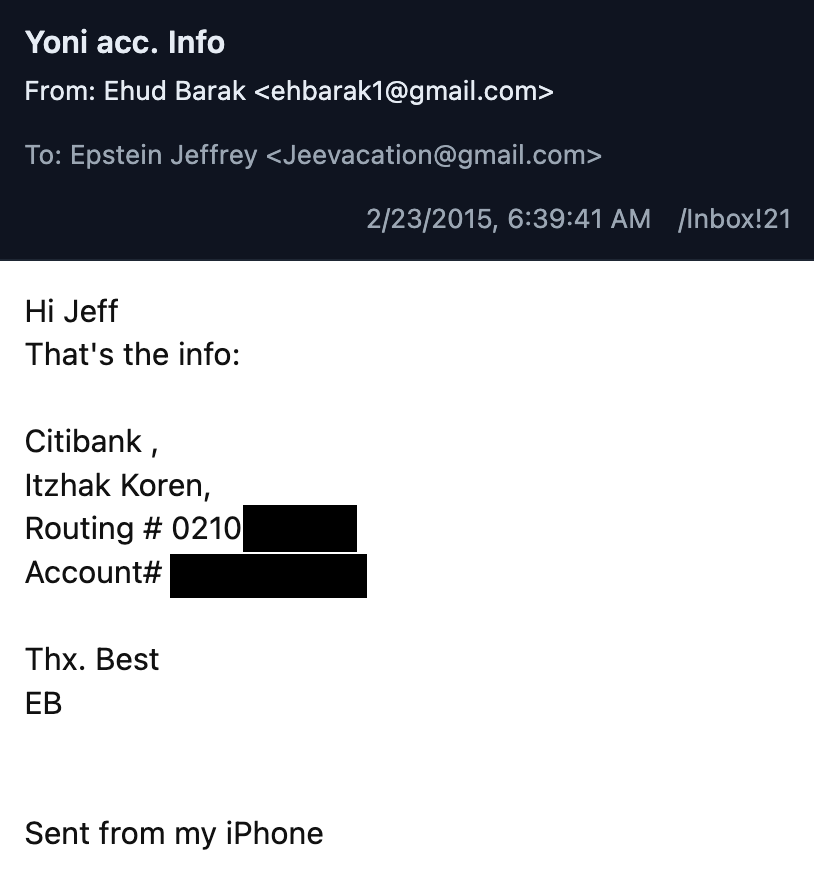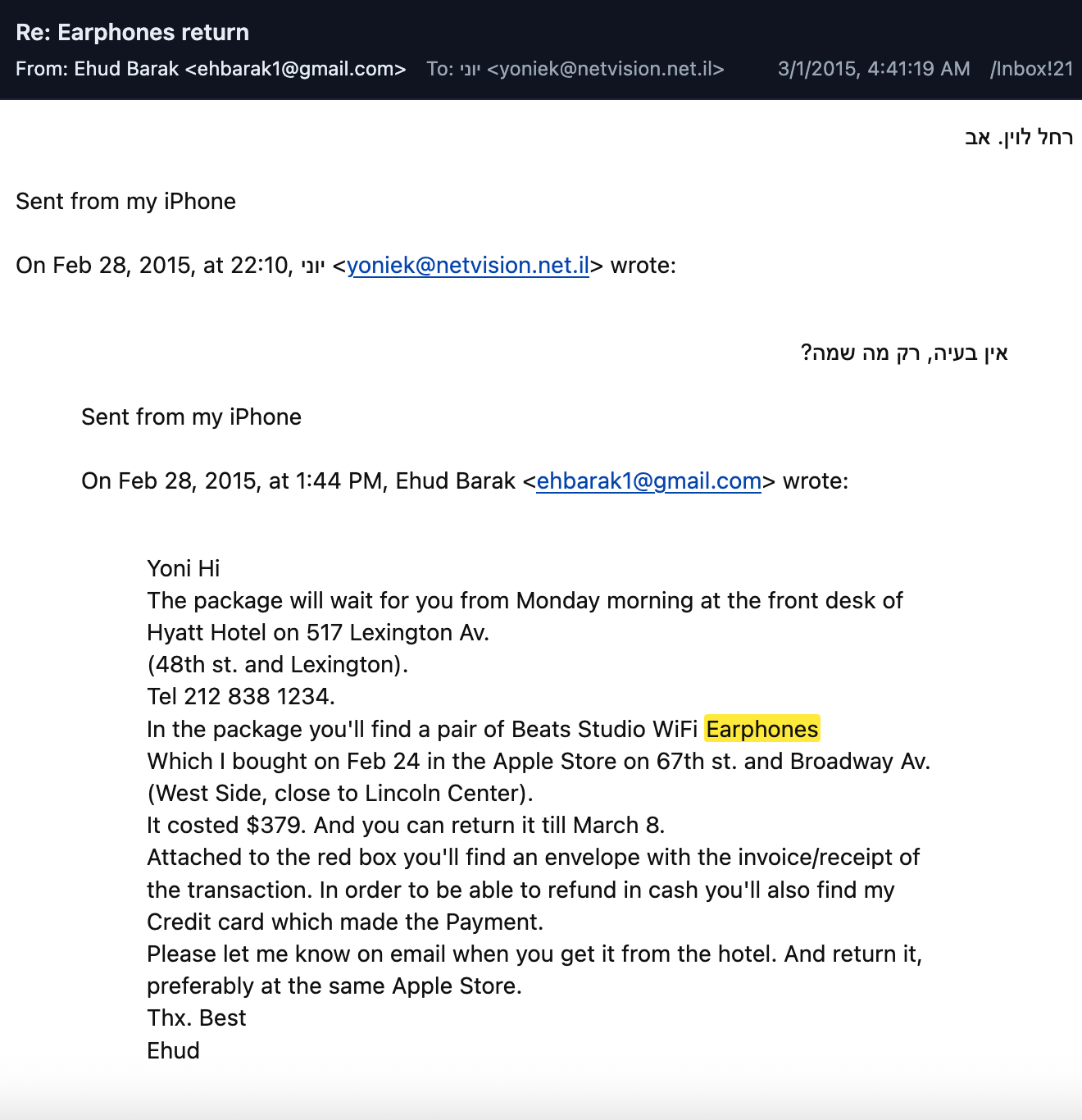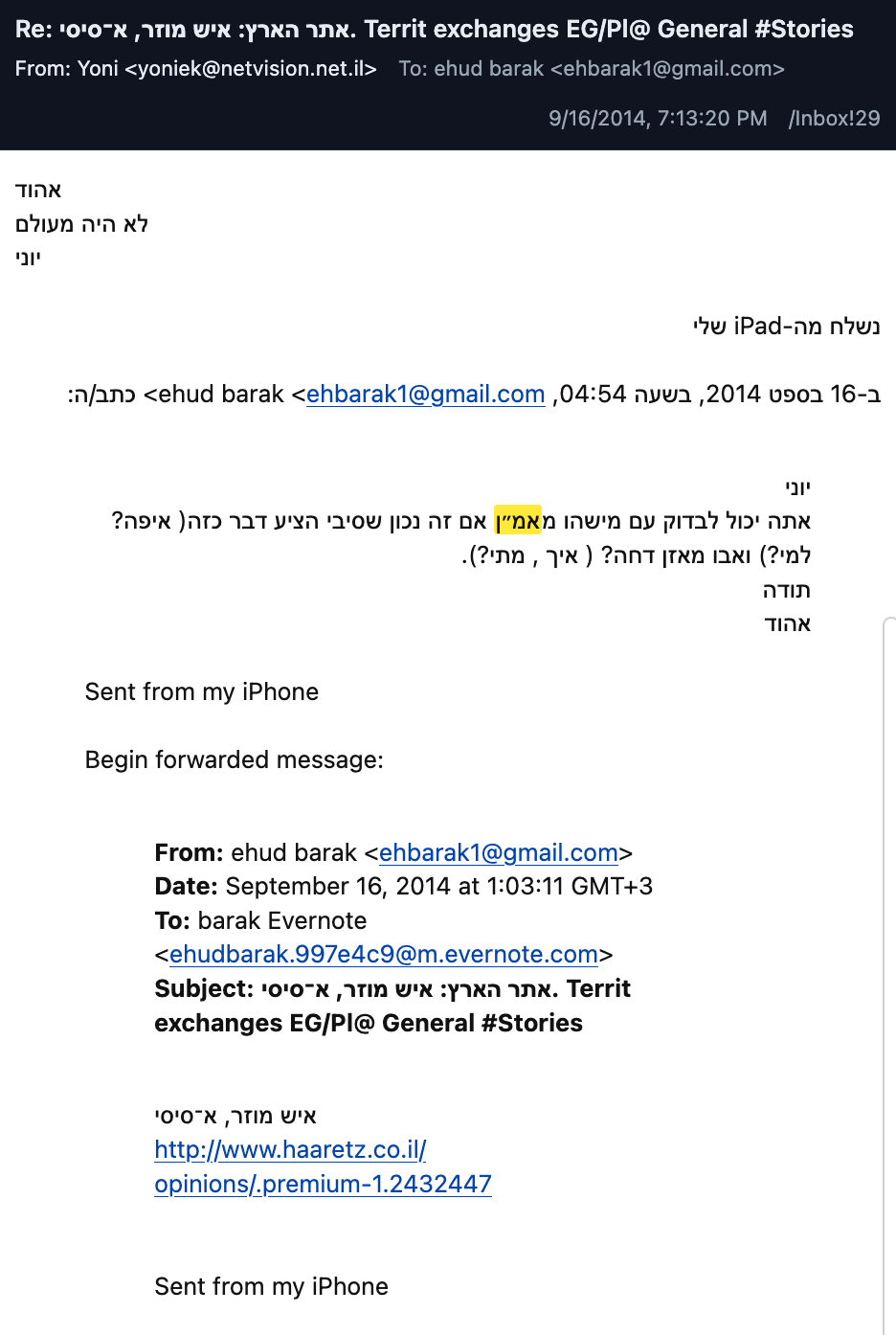With the looming end of the U.S. government shutdown amid a deal in the Senate, the House will soon be swearing in Adelita Grijalva to her rightful seat from Arizona, after a historic delay at the hands of Speaker Mike Johnson, taking direction from President Donald Trump, all aimed at blocking her from becoming the final signature needed to force a vote on releasing the Epstein files.
In mid-October, the House Oversight Committee released an interview with former U.S. prosecutor Alex Acosta, who told the panel that—contrary to widespread public reporting—he had never told Steve Bannon that Epstein “belonged to intelligence.” Acosta denied ever discussing Epstein with Bannon, and claimed to have “no knowledge as to whether he was or was not a member of the intelligence community.”
Yet, along with Acosta’s interview, the House panel also released a new cache of documents from Epstein’s estate containing direct evidence of Epstein’s links to Israeli intelligence: Epstein’s personal calendars reveal that a senior Israeli intelligence officer, with personal ties to former CIA Director Leon Panetta, lived at Epstein’s Manhattan apartment for multiple stretches between 2013 and 2016. When cross-referenced with emails leaked from the inbox of former Israeli Prime Minister Ehud Barak, a portrait emerges of Epstein at the nexus of high-ranking intelligence officials in both the U.S. and Israel.
This is the fourth piece in Drop Site’s ongoing series on Jeffrey Epstein’s role in brokering intelligence deals for Israel.
In the first, we exposed Epstein’s role in brokering a security agreement between Israel and Mongolia. In the second, we identified Epstein’s effort to set up a backchannel between Israel and Russia during the Syria civil war. In the third, we showed Epstein’s role as a key facilitator of a security agreement between Israel and the West African nation of Côte d’Ivoire.
Meanwhile, we’re left wondering why the rest of the media, which has demonstrated no lack of excitement when it comes to the saga of Jeffrey Epstein, has all of a sudden lost its reporting capacity, in the face of reams of publicly available newsworthy documents. A question for editors reading this newsletter: What are you doing?
From a place of competition, we’re glad the media are sitting on their collective hands and we’re proud to have broken this series of stories, which give us a glimpse of a world that is often hidden from public view. But it’s also a topic that would benefit from the collective attention of our national media. Here’s hoping some will join in.
Either way, we’ll continue the work, and are grateful for the support of readers who make it possible. If you haven’t yet upgraded your subscription, please consider doing so.
Last week, we let you know that an investigation we published on the BBC is now the subject of a lawsuit we intend to fully contest—the article can be read here—and that we needed help raising money to cover legal costs that had already approached $40,000. In just a few days, readers donated nearly $200,000. An enormous thank you from all of us at Drop Site. Having the resources to fight back in court is a game changer.
If you’d like to give or share the fundraiser, please do so here.
Ehud Barak and Leon Panetta. Photo obtained via Ehud Barak’s emails.
Israeli Spy Stayed for Weeks at a Time With Jeffrey Epstein in Manhattan
Leaked emails show Epstein working on a wire transfer to Ehud Barak’s top aide, Yoni Koren, who regularly stayed at his apartment.
An Israeli military intelligence officer stayed at Jeffrey Epstein’s Manhattan apartment on at least three occasions—including once, in February 2013, while working as a senior aide to then-Israeli Minister of Defense Ehud Barak.
Yoni Koren made his intelligence career working in covert operations alongside the Mossad, and remained a lieutenant colonel in reserve duty after he officially left the intelligence directorate. He stayed in Epstein’s apartment again for two weeks, in October 2014, and a third time for ten more days in September 2015.
Drop Site compiled evidence of these stays from schedules released by the House Oversight Committee last month and Barak’s hacked emails, originally released by the Handala hack team and later shared by Distributed Denial of Secrets.
On all three trips, Koren appeared to be conducting official or unofficial business. A Times of Israel article from late January 2013, a few weeks before Koren’s first documented stay, identifies him as still actively serving as the “bureau chief” for the Israeli Ministry of Defense that month.
Epstein’s personal calendar, 2/21/2013. Source: House Oversight Committee.
After Barak’s retirement from government, Koren continued to serve as an informal intermediary between the American and Israeli intelligence communities, with Barak acting as his handler. Email records show Barak using Koren as an intermediary to exchange information with AMAN, the Israeli military intelligence directorate. Koren was also active in Epstein and Barak’s efforts to source cybersecurity startups from the technology research units of AMAN, demonstrating how enmeshed in Israeli spy networks he remained.
In February 2015, leaked emails show Barak sending Epstein bank details for funds to be wired to Koren’s Citibank account. The purpose of the wire transfer is not known. Drop Site was unable to confirm if the funds were successfully transferred. But the bank transfer information was followed by an unusually cryptic communication between Barak and Koren regarding hand-off of a physical bank card.
Koren helped arrange a private tour of the White House and Pentagon for Barak and his grandchildren, which took place a few days later. The Pentagon trip was coordinated by Jeremy Bash, former chief of staff of the Central Intelligence Agency and the Department of Defense (as well as the ex-husband of CNN host Dana Bash). Koren and Bash helped to exchange messages and arrange meetings between their respective bosses—Barak and Leon Panetta, the former C.I.A. Director and Secretary of Defense.
“Keep the Card”
On February 14, 2015, Barak sent a note to Epstein. “Hi Jeff Will you be in NY during the coming week?”, Barak wrote. Epstein replied, “im flying back to ny tues to meet with you.” Epstein’s personal calendars, released by the U.S. House Oversight Committee last month, shows that they ultimately met on February 19 at 5 p.m.
But the two men had a second, last-minute meeting that wasn’t reflected on calendars released by Congress. According to hacked emails, Barak arranged an urgent appointment with Epstein on February 20, writing, “Are you still in town? Can we meet again for 30min today or tomorrow?.” Epstein’s meetings had run late the previous night, and he’d already missed his flight to Paris—but he agreed to meet.
Three days later, on February 23, Barak sent Epstein an email titled “Yoni acc. Info,” containing wire transfer details for a Citibank account belonging to “Itzhak Koren.”
Barak sends Koren’s bank transfer details to Epstein. February 23, 2015.
The purpose of the wire transfer is not apparent from the email records. That Saturday, February 28, Barak sent an unusual email to Koren, containing detailed instructions to pick up a package from the Hyatt 48LEX hotel in Manhattan’s Midtown East.
According to the email, Barak purchased red “Beats by Dre” headphones on February 24, the day after sending Epstein the bank details. Barak instructed Yoni to collect a package containing the headphones from the hotel and return them to an Apple Store on the Upper West Side. According to Barak’s message, attached to the box was an envelope with a receipt and a bank card. Barak wrote Koren, “To get a refund in cash, you’ll need the card. Email me when you collect it.”
Barak’s request was highly unusual. For one thing, it was in English. Across hundreds of emails exchanged between Barak and Koren in the leaked email dataset, the two men communicated almost exclusively in Hebrew. It was also unheard of for Barak to request Yoni to run a mundane errand, and the timing of the exchange also raises a red flag. After purchasing the headphones and leaving them for Koren, Barak was scheduled to leave the country.
Koren seemed to immediately understand Barak’s request, and he agreed, writing back, in Hebrew: “No problem, what’s her name?” Barak replied with a woman’s name: “Rachel Levin.” This name doesn’t appear anywhere else in Barak’s emails and it’s unclear who or what he was referring to.
Barak makes an unusual request for a mundane errand. Koren says, “No problem, what’s her name?” Barak replies, “Rachel Levin.”
The next Monday, March 2, Koren collected the package and reported to Barak that the card had been credited with the funds. Barak instructed Koren to “Keep the card,” and they made arrangements to meet in Israel. On March 12, after a brief trip to London, Barak landed in Tel Aviv and immediately emailed Koren, asking to speak on the phone.
Koren and Barak at the 9/11 Memorial in New York City, no date. Private photo from Barak’s inbox.
“It Never Happened”
Sometimes an earphone is just an earphone, but Barak and Koren had good reason to write emails in coded language. Documents leaked by Edward Snowden just over a year prior revealed that the two men were major counter-intelligence targets for the United States and the NSA had been snooping on their messages.
Koren’s intelligence career began in the Research Division of AMAN, the IDF’s Military Intelligence Directorate, eventually rising through the ranks to become a senior officer. In 1985, Koren worked on a covert campaign with Mossad to help Syrian intelligence kidnap PLO operatives traveling from Cyprus to Lebanon. Koren described the operation in an interview with Israeli New York Times journalist Ronen Bergman, for his book “Rise and Kill First.”
When Barak became the Chief of Staff of the IDF in the 1990s, Koren became his Bureau Chief, managing Barak’s schedule and operations. He was also an assistant to Israel’s military attaché in Washington, coordinating senior Pentagon contacts like Colin Powell, then the Chairman of the Joint Chiefs of Staff. After Barak left the IDF, Koren headed Barak’s staff as Interior Minister, then Foreign Minister, then Defense Minister. Barak served as prime minister from 1999 until 2001.
Koren and former Secretary of State Colin Powell, no date. Private photo uploaded to Wikimedia Foundation in 2021.
After Barak’s retirement, Koren was a covert “fixer” in Washington, who enjoyed special access to senior national security figures, including Leon Panetta, and his senior adviser, Jeremy Bash. Panetta, who went straight from director of the CIA to defense secretary under former President Barack Obama, was Barak’s U.S. equivalent. As soon as Barak left the Israeli government, Koren became a key go-between for Barak and the American and Israeli intelligence communities.
On March 25, 2013, one week after Barak left his defense minister post, Koren forwarded a personal invitation from Jeremy Bash to participate on a panel on the Arab Spring (or as they called it, “Middle East turmoil”) at the Panetta Institute for Public Policy in Monterey, California. In an email thread with Bash, Barak agreed to come to California, and expressed his eagerness to discuss “possible opportunities with LP [Leon Panetta] and YK [Yoni Koren].”
The Panetta Institute invitation to Barak, two days after Barak left his defense minister post in Israel.
After the Monterey event, Barak and his wife drove north to the San Francisco Bay Area, for a private meeting with Oracle founder Larry Ellison at his mansion in Woodside, a massive estate modeled after a 16th-century Japanese emperor’s palace. In his Evernote app, Barak bookmarked a conversation with Ellison’s chief of staff, with the tags “@Private” and “#Initiatives.”
The following year, according to Epstein’s personal calendars, released by the House, Koren stayed at Epstein’s spare apartment again, for the first two weeks of October 2014. The calendar released by the House committee reads: “Reminder: Yoni in apt Sept. 30-Oct 13.”
In the weeks preceding his stay at Epstein’s apartment, Koren maintained contact with spies in AMAN, despite his supposed status as a “private citizen.” On September 14, 2014, Barak and Koren exchanged emails about a Haaretz opinion column titled “A strange man, al‑Sisi” that asserted Egyptian President Abdel‑Fattah el‑Sisi offered to give Palestinians a huge plot of land in the Sinai peninsula, adjacent to Gaza, but Mahmoud Abbas rejected the idea. Barak asked Koren to confirm with someone in AMAN if the report was true. Koren returned a few hours later with a response: “It never happened.”
Emails between Barak and Koren, September 16, 2014.
The emails suggest Koren worked as a two-way intermediary, with Barak hinting at Koren to pass a message back to contacts in Israel. When Haaretz published a second column about el-Sisi’s alleged offer, the next day, Barak wrote Koren: “2nd time? Probably someone should deny it.”
On October 6, 2014, while staying in Epstein’s apartment, Koren forwarded Barak a message from Bash, Panetta’s henchman, containing details of Panetta’s travel dates to promote his book “Worthy Fights,” about his service as C.I.A. Director and Secretary of Defense under President Obama. The message was taken by Barak as a proposal by Koren to meet with Panetta in New York. He expressed that he would be unable to make it in time.
Barak later asked Koren for help getting special access to secured areas of the White House and Pentagon. On December 8, 2014, Barak emailed Koren to inform him of plans to take his daughter and two grandkids to Washington D.C. in the spring, writing, “I want to take them to the WH and get there something more than the regular public tourists visit…Please see if you can be of help.”
Bash took care of the arrangements for Barak and his family to get access to secure facilities in the White House and the Pentagon. Bash was by then a private citizen, and he had started his own consulting company, Beacon Global Strategies — but he still enjoyed high-level access to the White House and U.S. defense establishment. Yoni helped Barak pass along his family’s passport details to Beacon, so they could receive clearance.
Barak, his daughter, and his two grandchildren visited the White House and Pentagon on March 31. They received a Secret Service escort, and a guided tour from Yael Lempert, a Special Assistant to President Obama, and the National Security Council director for the Levant, Israel, and Egypt. Lempert later negotiated the largest military aid package in American history, a ten-year, $38 billion dollar package for Israel, in 2016.
Barak visits the White House with Leon Panetta, May 17, 2012. Photo: Public domain.
The Pentagon visit was coordinated by Eric Lynn, another senior advisor to Panetta, who arranged for a private tour by Laura Updegrove, the Defense Department’s Israel Country Director. A few weeks after the visit, in April 2015, Lynn emailed Barak details about fundraising for his congressional campaign in Florida’s 13th District—Barak forwarded the message to Koren, asking ,“What should be done?” Yoni replied: “You don’t have to do anything.”
Lynn lost. The seat is now held by Republican Rep. Anna Paulina Luna, who spearheads the House effort to release the Epstein files. Lynn did not respond to request for comment.
“Endless loyalty to the state”
Yoni Koren died of cancer on January 8, 2023. His career of service to Israel ran exactly parallel to Barak’s, albeit in the shadows. He remained one of Barak’s most trusted advisors and closest confidantes throughout his military and civilian careers. Barak did not respond to a request for comment; neither did Jeremy Bash.
On Koren’s passing, Barak wrote a eulogy for Koren, calling him, “A talented intelligence officer…with endless loyalty to the role, the IDF and the state. A brave man who knew no fear, even when he stood in front of the forces of evil.”
Koren stayed in Epstein’s apartment for a third time in September 2015.
Correction: The article headline originally referenced Epstein’s mansion in Manhattan. The address in question was a separate apartment owned by Epstein in the city. Koren was a senior officer in AMAN but not the head of the military intelligence directorate.
From Drop Site News via this RSS feed












